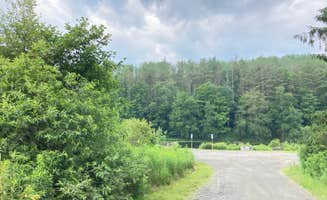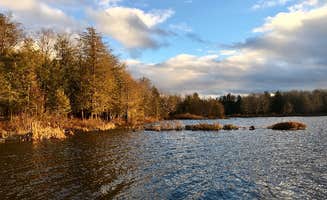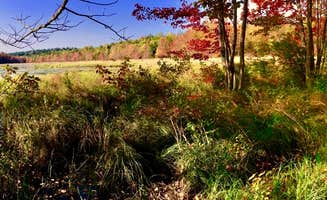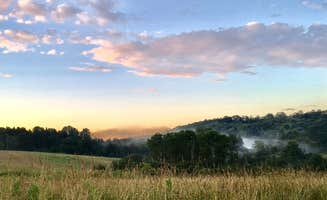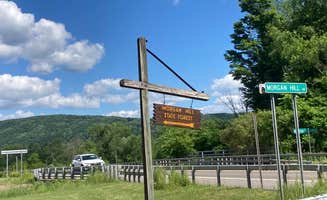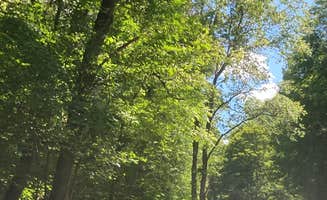Rustic camping near Chenango Forks, New York takes place largely in state forests situated between 1,000-2,000 feet elevation, creating a diverse woodland habitat with mixed hardwood and conifer stands. The region experiences four distinct seasons with heavy snow possible between November and April. Most primitive camping areas remain unplowed during winter months, with accessibility often dependent on recent weather conditions.
What to do
Fishing opportunities: At Long Pond Campground, the large pond offers multiple access points for anglers. "The pond is quite large compared to other area ponds, and there are three accesses for fishing: a regular boat launch with parking lot and dock, a carry-in kayak access near campsite 6, and a handicapped accessible fishing pier near campsite 1," notes one visitor.
Hiking trail networks: Morgan Hill State Forest Dispersed offers extensive trail systems including the Onondaga Trail. "The woods are beautiful and the trails are well developed, but also be prepared for ticks and the need for repellent as they are thick in spring and early summer," writes a camper. Trail users should download forest maps as trails "crisscross in a confusing network and you can get easily turned around without a map."
Wildlife viewing: Many state forests provide excellent opportunities for bird and animal watching. "Round Pond has a beautiful and accessible raised boardwalk to a unique overlook that has a beautiful vista over the bog and is an amazing place for birdwatching especially during spring migration," writes a visitor about the Pharsalia Woods area.
What campers like
Seclusion and quiet: Whaupaunaucau State Forest provides peaceful camping away from crowds. "This is a relatively unknown oasis outside of the county, but this state forest has a network of miles of trails for both hiking and cross country skiing," notes one camper who appreciated the "lovely hilly vistas, pondside glens, and lots of clearings near clear streams deep in this old stately forest."
No-fee camping: Most dispersed sites in the area are free to use. A Long Pond Campground visitor stated, "I am planning on staying here for a week or more and I see no reason to find another location as there is no fee or permit needed and you can stay up to 14 days I believe."
Natural features: The diverse landscape offers unique environments for outdoor enthusiasts. One camper at Bucks Brook State Forest Primitive Tent Site described how "Bucks Brook carves a beautiful gorge through Bucks Brook State Forest before it cascades into the Otselic River." The area features "a series of small waterfalls at the bottom of the gorge to the source of the creek near the top of the ridge."
What you should know
Limited or no facilities: Most sites have minimal or no amenities. A visitor to Bear Wallow Pond Dispersed Campsite noted, "This is a primitive undeveloped campsite, there is a clearing for tenting but no potable water or amenities of any kind."
Road conditions: Access roads to many sites may be challenging. At Beals Pond State Forest, a camper warned, "This state forest is beautiful but not easily accessible in the winter. After a certain point, the road is not maintained in the winter and I was unable to get cell reception with Verizon."
Tick awareness: Several reviewers mention ticks as a concern in warmer months. Whaupaunaucau State Forest is "a great place to get away from it all for hiking and camping but it is also a fantastic place to go if you enjoy botanizing or birding, lots of unusual species to see. Just beware of ticks, they are invading the region."
Camping regulations: Standard New York State forest regulations apply. Sites must be 150 feet from water sources, and stays are limited to 14 days. One Morgan Hill State Forest visitor advised campers to follow "state forest camping rules such as not setting up camp within 150 feet of a stream or other body of water."
Tips for camping with families
ADA accessible options: Some sites offer limited accessibility. At Morgan Hill Forest—Onondaga Trailhead campground, "there are two lovely developed campsites with parking spot right next to a cement pad with picnic tables and fire pits. These are very nice roomy wooded campsites, and the developed sites are supposedly ADA accessible."
Safer sites: Choose established areas with some oversight. At Long Pond Campground, a camper noted, "People have driven in to fish and kayak so I don't feel isolated and afraid, and I am just a few steps away from sitting on the dock and admiring the scenery."
Seasonal considerations: Winter camping requires extra planning. Beals Pond visitor warned about road access issues, noting "after a certain point, the road is not maintained in the winter" and cell service may be unavailable.
Fire preparation: Bring necessary fire supplies. At Long Pond, "Each spot seems to have plenty of shade and access to downed firewood, and it looks like there are fire pits at each site. Lots of good tinder left over from previous guests which has been helpful."
Tips from RVers
Site limitations: Most dispersed areas accommodate only small trailers or vans. A Long Pond Campground visitor noted, "Campsites are level and long enough for a very small trailer. The trees are so thick we could not feed our solar panel."
Power considerations: Solar power can be challenging due to dense forest cover. One camper mentioned, "We stayed in the space across from the port-a-pottie. The other camping spaces were close enough to see their campfire at night but far enough away that it's still quiet."
Cell service variability: Coverage varies significantly by location and provider. At Long Pond, a camper reported "T-Mobile service has been exceptional," while at Beals Pond State Forest, another camper "was unable to get cell reception with Verizon."
Limited amenities: Expect primitive conditions. A visitor stated, "Would rate 5 stars if it had water and a garbage dumpster. Site has no water, no garbage service and no phone signal."


